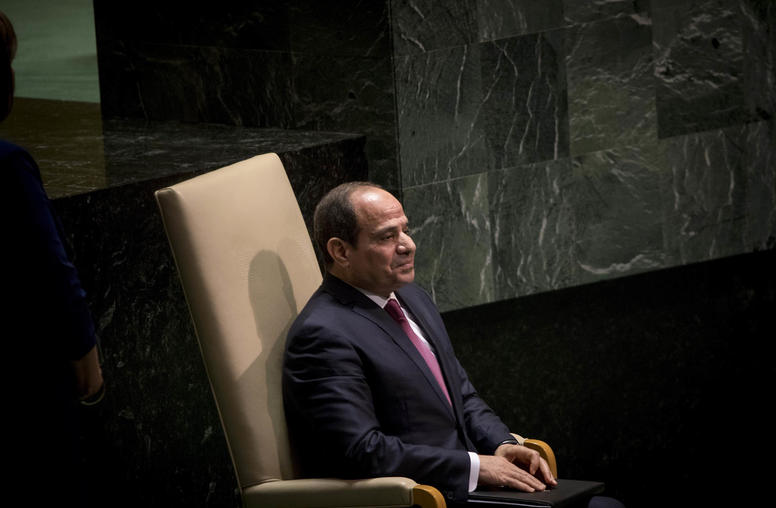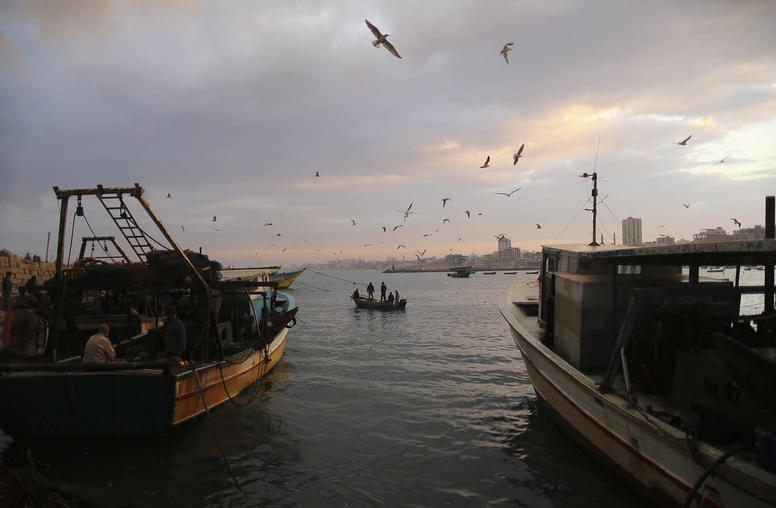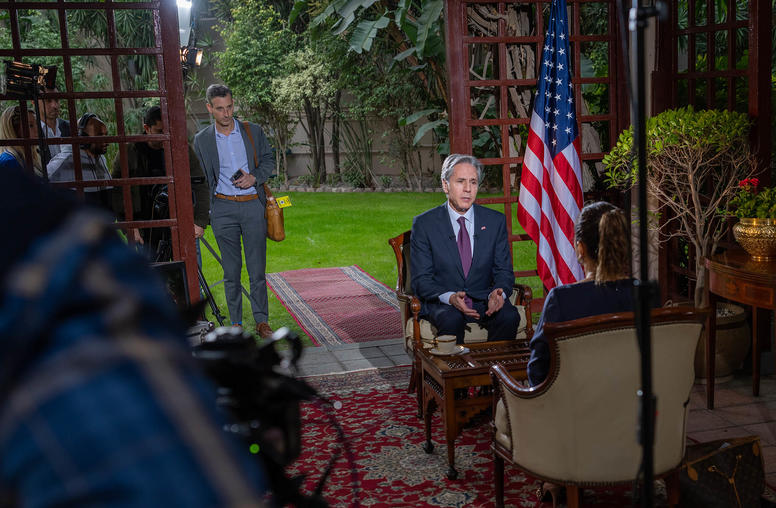Shibley Telhami on Egypt
Egyptian police crack down on the second day of protests. Shibley Telhami, former USIP Board Member (2000-2002) and member of the Senior Working Group on Middle East Peace, talks to USIP about the situation in Egypt.
January 27, 2011
Shibley Telhami, former USIP Board Member (2000-2002) and member of the Senior Working Group on Middle East Peace, talks to USIP about the situation in Egypt as police crack down on the second day of protests.
A leading scholar on the Middle East, Telhami teaches at the University of Maryland as the Anwar Sadat Professor for Peace and Development, is a nonresident senior fellow at the Saban Center for Middle East Policy for the Brookings Institution, and a former adviser to the U.S. Mission to the United Nations and the Iraq Study Group. He is also the editor of a USIP-published book, “The Sadat Lectures.”
- How do you assess what is happening politically in Egypt over the past few days as public outcry continues? Is this related to Tunisia?
- In recent years you have done groundbreaking polling research in Egypt and the region. Did the data from those surveys lead you to think this would happen?
- What should we watch for next?
- Read additional perspectives >>
How do you assess what is happening politically in Egypt over the past few days as public outcry continues? Is this related to Tunisia?
There is little doubt that the timing -- though not the causes -- of the demonstrations in Egypt was related to the events in Tunisia. The latter inspired many oppositional forces across the Arab world and were particularly empowering because of the apparent absence of major political organizations mobilizing the protests. In Egypt’s case there appears to have been even more use of the Internet and social media in mobilizing crowds into the streets.
This, I think, is both a weakness and a strength. The strength is that it is harder for government to dismiss the protests as an instrument of an unpopular third party. What happened, for example, during the Bush administration, when there was focus on democratic change in the Middle East following the Iraq war, the public in Egypt was so angry with Washington over Iraq and the Arab-Israeli issue, and so mistrustful of American intentions, that genuine democratic forces in Egypt, whose efforts predated the Bush administration's policy, found themselves on the defensive when their efforts were linked to the White House. Pro-government forces certainly used that against the opposition. Later, when there were Egyptian voices and demonstrations calling for change, over both domestic and foreign policy issues, the government highlighted the role of Iran and its supporters, particularly Hezbollah, to portray dissent as foreign instigated. It's hard to do that in this case. In addition, when you have a particular party or an individual who are the faces of a movement, it's easier for governments to take limited action against a few in a matter that is consequential.
On the other hand, it is hard to know how long these demonstrations can be sustained, or what is the threshold of pain for the public when casualties mount (and whether or not the barrier of fear is really broken). And what group will exploit these apparently spontaneous demonstrations in a manner that taints them, and whether or not you have counter-demonstrations from supporters of the regime.
Each country is different, both in terms of public determination and attitudes, and the structure and roles of its security services. But for now, what is clear is that the information revolution and the explosion of the use of social media have become not only instruments of spreading news, but also instruments of mobilization. In that sense, there are new elements that make the environment far more unpredictable than in the past.
In recent years you have done groundbreaking polling research in Egypt and the region. Did the data from those surveys lead you to think this would happen?
The most striking finding over the last decade of polling in the Arab world is the widening gap between governments and publics in the region. It isn't that this gap is new, as it has been identified by most observers over decades, even before scientific polling was possible. But what's clear is that over the past decade and a half, perhaps aided by the information revolution, which robbed governments of a near-monopoly on information, the gap has widened. The most common heroes of the Arab public in the region broadly are personalities that most Arab governments despise (Hassan Nasrallah of Hezbollah, Hugo Chavez of Venezuela, Recep Erdogan of Turkey, and even Mahmoud Ahmedinijad of Iran).
More telling is the trend in how people identify themselves: In 2010, only one-third of Arabs polled identified themselves first and foremost in relation to their own states, while two-thirds identified themselves as being Muslim or Arab first. This seems to reverse an earlier trend, particularly in the 1970s and 1980s in which governments managed to bolster state identities. There are of course, many reasons for this, and these reasons vary from state to state, but because of the prevalence of authoritarianism in the region, most people do not differentiate between "the state" and "the regime," at least subconsciously. So most analysts understood that there is pervasive anger in the region over the existing order, and there were episodes of venting in the past, usually over specific issues such as rising food prices or core foreign policy issues. What was not clear to most analysts was what the consequence would be.
What should we watch for next?
The uncertainty about consequences in the past, as in this case, is perhaps more a function of how analysts and social scientists are trained: We are trained to learn from the patterns of the past and project them onto the future. So our ability to predict genuine change is limited, as change is by definition is a break from the past. And when we do predict accurately, it seems highly arbitrary. I once composed a cartoon op-ed in the Los Angeles Times highlighting this dilemma for analysts when it comes to the impact of Arab public opinion. So for most analysts, who look at the past, and what they see is that revolutions are rare in history, and they are even rarer in the Middle East. They also see that over the decades, since the inception of the current Middle East political system, rulers have learned to address the anger of their publics, and manage it, and come out on top, more often than not. So no one wants to go against the historical trend, as they will repeatedly be shown to be false prophets. And one day you wake up, and you have a shocking popular revolution in Tunisia. The instinct is to see it as unique, or even to engage in a war of narratives about what really happened in Tunisia: was it really a popular revolution with a president fleeing before the public's wrath, or was it, as some media outlets in the region suggested, a failed coup attempt by the head of state security, only to be denied by the military?
 Everyone, even analysts, has a stake in how these events are interpreted, because whether or not an Egyptian, or Libyan, or some other Arab believes they can be liberated, and is willing to risk their life, is a function of their belief of whether or not the same strategy worked in Tunisia. There will also be a war of narratives over the outcome: did the events lead to democracy, or to another authoritarian regime? Is stability restored, or does anarchy spread in a manner that frightens everyone else in the region, as happened following the 2003 Iraq war. This battle of narratives will be important in determining the extent to which there will be spillover effects in other parts of the Arab world that are sustainable.
Everyone, even analysts, has a stake in how these events are interpreted, because whether or not an Egyptian, or Libyan, or some other Arab believes they can be liberated, and is willing to risk their life, is a function of their belief of whether or not the same strategy worked in Tunisia. There will also be a war of narratives over the outcome: did the events lead to democracy, or to another authoritarian regime? Is stability restored, or does anarchy spread in a manner that frightens everyone else in the region, as happened following the 2003 Iraq war. This battle of narratives will be important in determining the extent to which there will be spillover effects in other parts of the Arab world that are sustainable.
But for now, a large number of Arabs, including Egyptians, want to believe that the Tunisian people breached a wall of fear and overthrew a despised dictator. This will remain the narrative of the day among many, perhaps most, regardless of the ongoing battle of interpretation. If the past is any guide, governments, the ruling elites around them and the security services behind them more often than not manage to withstand the pressure and adjust. Except that the forces that appeared indispensible in the events in Tunisia, namely the sharing of information, if not the use of social media, as an instrument of mobilization, are new variables, the likes of which we had not fully experienced, and they provide a wildcard that highlights the limits of what we can predict.
It is useful to keep in mind that in the late 1950s and early 1960s, when popular anger spilled over across the Arab world following the British-French-Israeli assault on Egypt following the "Suez Crisis" of 1956, an element of the game was the Egyptian understanding of the role of transnational media, and the Egyptian employment of transnational effective radio, that broke the governmental monopoly of information in its target Arab states. It is not surprising that today, as Egypt witnesses a new wave of demonstrations, one of the first acts of the Egyptian government was to block social media.
Additional Perspectives
- USIP Tracks the Unfolding Situation in Egypt
Check here for a comprehensive look at the situation in Egypt. - Former U.S. Ambassador on Initial Days of Protest
By Daniel C. Kurtzer, former U.S. ambassador to Egypt - Egypt Today: Historical Context of the Protests
By Qamar-ul Huda, senior program officer, Religion and Peacemaking Center of Innovation - Read more: USIP Tracks the Unfolding Situation in Egypt



